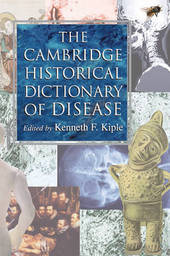
|
The Cambridge Historical Dictionary of Disease
Hardback
Main Details
Description
The Cambridge World History of Human Disease (CWHHD) was first published by Cambridge University Press in 1993 and reprinted in 2001. Part VIII, the last section of the work, comprises a history and description of the world's major diseases of yesterday and today in chapters that are organized alphabetically from 'Acquired Immune Deficiency Syndrome (AIDS)' to 'Yellow Fever'. The Cambridge Historical Dictionary of Human Disease makes this last section of CWHHD available to a wider general audience. It condenses the essays into shorter entries, with up-to-date information on AIDS, Alzheimer's disease, Ebola virus disease, and tuberculosis. The Dictionary also makes available three chapters from other parts of the CWHHD on 'Heart-Related Diseases', 'Cancer', and 'Genetic Disease'. This Dictionary contains contributions from over 100 medical and social scientists from all over the globe, making it a truly interdisciplinary history of medicine and human disease.
Reviews'... it is full of fascinating snippets ... Put the entries together and you get a fine historical perspective from which to judge the panic over the 'global threat' posed by Sars or the risk posed by 'infectious immigrants.' Health Service Journal 'Written for a wide audience, including health professionals and the general reader, this dictionary offers a clear understanding and intriguing history of human disease ... an easy, accessible style ... '. Reference Reviews '... the book is readable and provides a good introduction to the topics. The information is accessible and does not require prior knowledge. It can also be useful to have a potted history of disease in one volume. In terms of readership, it should be an excellent source for family historians and genealogists who would like to know more about the diseases suffered by their ancestors.' Annals of Human Biology '... readers ... will effortlessly acquire a reliable basic understanding of each disease as it exists today, and of its emergence onto the biomedical stage ... readers ... particularly students, find themselves better prepared to tackle more complex and more specialized texts.' British Journal for the History of Science
|